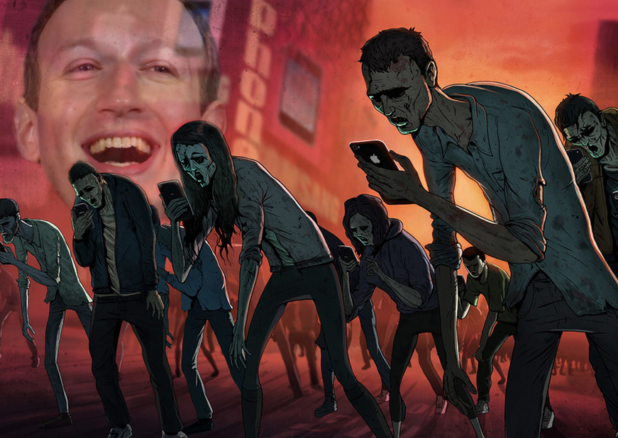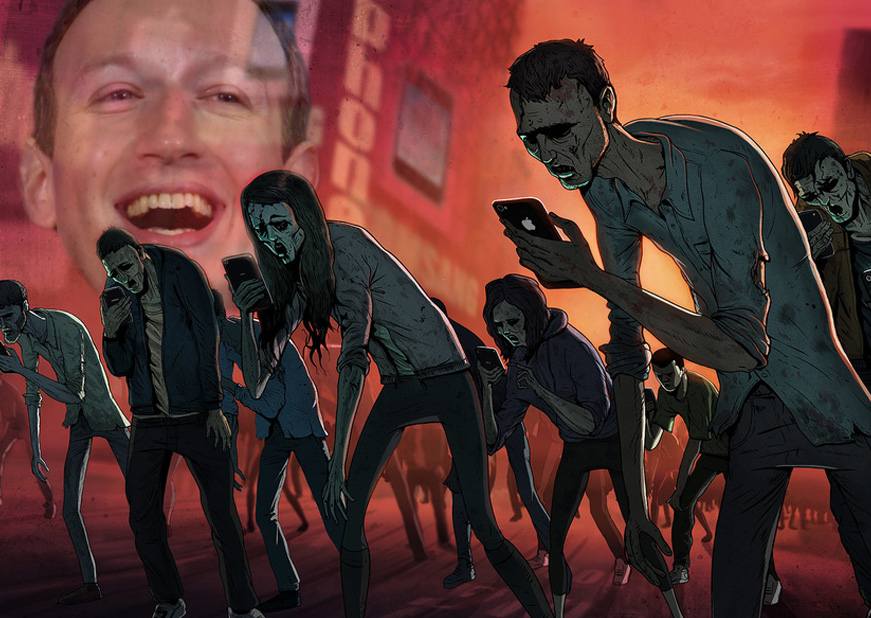Adrian Sol
Daily Stormer
November 11, 2017

How reassuring.
Being alone at your computer is “socializing.”
Being fed ads and fake news by algorithms is “being informed.”
Having your entire life online is “privacy.”
Big Zuck is watching you – for your own good. And also because he makes craptons of money from doing it.
Slate :
Are Facebook and other social media companies intentionally exploiting people’s psychological vulnerabilities to keep them addicted?
You bet, says Sean Parker, who made a fortune as an early Facebook investor and its first president. In an interview with Axios’ Mike Allen this week, Parker said that he has become something of a “conscientious objector” to social media. And he reflected with some regret on his own role in helping to mold the sort of company that Facebook would become.
“The thought process was all about, ‘How do we consume as much of your time and conscious attention as possible?’,” he said. “And that means that we need to sort of give you a little dopamine hit every once in a while, because someone liked or commented on a photo or a post or whatever, and that’s going to get you to contribute more content, and that’s going to get you more likes and comments. It’s a social validation feedback loop. … You’re exploiting a vulnerabilty in human psychology.”

The Zuck is enslaving us all!
Very nice of you to tell us this, buddy.
Too bad you had to wait until our whole society was completely zucked before you warned us
Parker went on: “I think the inventors, creators—it’s me, it’s Mark [Zuckerberg], it’s Kevin Systrom at Instagram, it’s all of these people—understood this, consciously. And we did it anyway.”
…
Even so, Parker’s recollections are instructive because they undercut the company’s claims to be driven by the lofty mission of making the world open and connected—or as the latest version has it, building community and bringing the world closer together.
Facebook is a horrible website. I absolutely hate it. The interface is confusing and cluttered, and everything about it is boring and tedious.
So it’s not surprising at all that the service’s popularity is based on psychological manipulation of human weaknesses, rather than on being a good service.
https://www.youtube.com/watch?v=yulB5t6gF9k
And of course, in spite of all this “online socializing,” people are more lonely and individualistic than ever. So what is even the point of these apps?
At the same time that Facebook was taking flak from Parker for its addictive qualities, another Silicon Valley startup was provoking similar criticisms. TechCrunch this week profiled a company founded by a neuropsychologist and a neuroeconomist with the goal of using machine learning to make other companies’ apps more, well, addictive. The startup’s name, aptly enough: Dopamine Labs. (It was also featured in an April episode of CBS’ 60 Minutes on the theme of “brain hacking.”)
Per TechCrunch’s story, Dopamine Labs has built a software program called Skinner—yes, it’s named after the behaviorist psychologist B.F. Skinner—that monitors an app’s various prompts and notifications and how users respond to them. The goal is to help companies tweak those features to make them maximally sticky. The company claims its service can add an average of 10 percent to the revenues of the startups that use it. “If all of that sounds creepy,” writes TechCrunch’s Jonathan Shieber, “don’t worry, it is.”
And now this whole notion of “brain hacking” is spreading everywhere in the software industry, including videogames. You can’t buy a mainstream title anymore without having to endure this whole “loot crates” bullshit designed to trigger psychological addiction.
I can’t think of a more direct attack on society than engineering a technology that is expertly designed to keep people addicted and wasting hours upon hours everyday. These things are destroying the productive capacity of entire nations.
There’s no doubt that they should be regulated.
